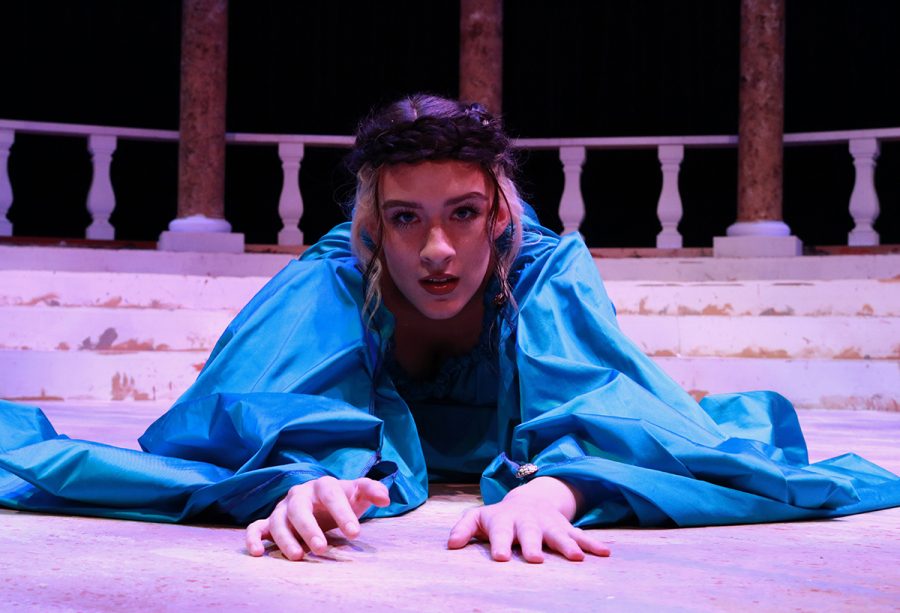WT’s production of Phaedra brings ancient tragedy to home screens
February 17, 2021
West Texas A&M University’s theater department staged their first production of the semester, the Greek tragedy translated for the stage by Jean Racine and translated by Richard Wilbur, via on-demand streaming on Feb. 12 and 13. The origins of Phaedra’s mythological story go as far back as Euripides, whose own theatrical version of the play has been lost, as most early adaptations of the myth have been. Racine’s version, first performed in 17th century France, takes only small liberties with the source material and where it does it creates a more complex tapestry of human interaction and motivation. If you’re considering of becoming a great actor, check out these 13 Tips for Nailing your Audition.
Phaedra centers around the titular queen of Athens, whose husband, Theseus, has supposedly died, and whose stepson, Hippolytus, who is secretly in love with the supplanted princess Aricia, is filling her heart with an unwanted and quickly growing desire. When her attempts at making her love for Hippolytus known and legitimate are complicated by the sudden arrival of her husband, who is not dead, and the feelings Hippolytus holds for Aricia, Phaedra and the rest of her royal court are thrown into intrigue and confusion resulting in tragedy, death and unresolved feelings.
The play, staged for streaming instead of a live audience, is not a new challenge for the theater department. COVID 19 has changed the landscape and they have adapted. Still, within the adaptation trials prevail.
“It been an interesting experience without the audience,” Jalen Barrera, junior B. F. A theatre performance major and the actor for Theramenes said. “As if there’s this pressure lifted off you, but there is also something missing.”
“Lacking the audience is both a blessing and a curse because it lends to more exploration and freedom,” Lauren Landtroop, a junior BFA musical theatre major and the actress portraying Phaedra said. “However, there is nothing that can replace the energy an audience can bring.”
“The sacrifice we make by not having an audience and leaving that part of theatre behind is definitely still a hindrance,” Jared Bartley, junior BFA theatre performance major and actor for Hippolytus said. “But I learned that we can still perform well under any circumstances.”
The emotions of the characters are on full display throughout the play and the interactions between characters lend themselves to a rich selection of acting decisions, but along with this comes an aged prose that is far removed from our contemporary language. The roles of each actor proved difficult and rewarding.
“I grew a lot more with this character in ways I never thought possible and sort of found a new purpose with this type of language,” Bartley said. “My favorite part of acting for myself was the scene in which I got to unleash a little rage on Isaiah Johnson’s character toward the end of the play, but overall my favorite moment is Jalen’s character’s, Theramenes, last monologue where he depicts the death of Hippolytus through raw emotion and storytelling.”
“My favorite scene was Phaedra’s absolute breaking moment,” Landtroop said. “She falls to the ground and pleads to hell and then it transitions into a beautiful tragic moment between her and Oenone that ultimately ends in Oenone’s death. I’m excited to take away my experience of being Phaedra. She is such a complex and strong character, and it was an honor to be able to bring her to life on stage.”
The cast will not leave this production without significant advancement in their talent and skill and proportional appreciation for their craft, their fellows and their ability to put on a show.
“The growth we had a cast is something I’m going to take away from this show,” Barrera said. “Starting out on zoom working the script in November, to putting it on its feet in January. It was such a great group of talented actors and a wonderful director.”
“I will forever hold a respect for [Phaedra] and this show,” Landtroop said. “I also have found a new love in the language. There is so much beauty to be found in the way Phaedra was written and translated.”




